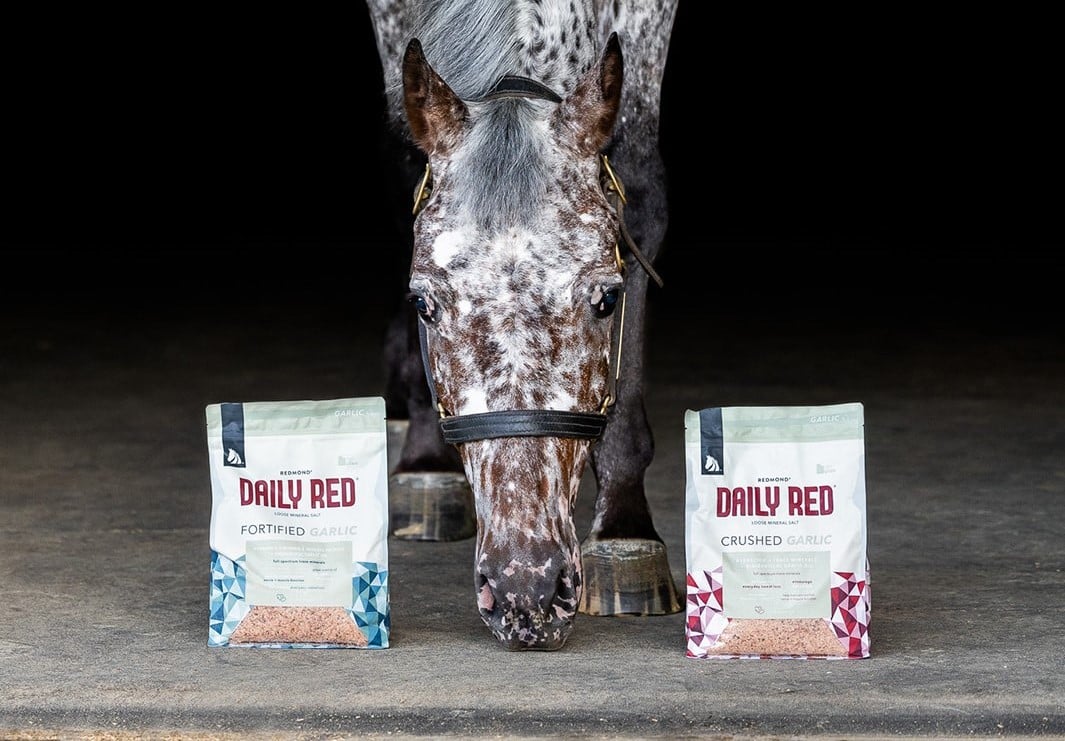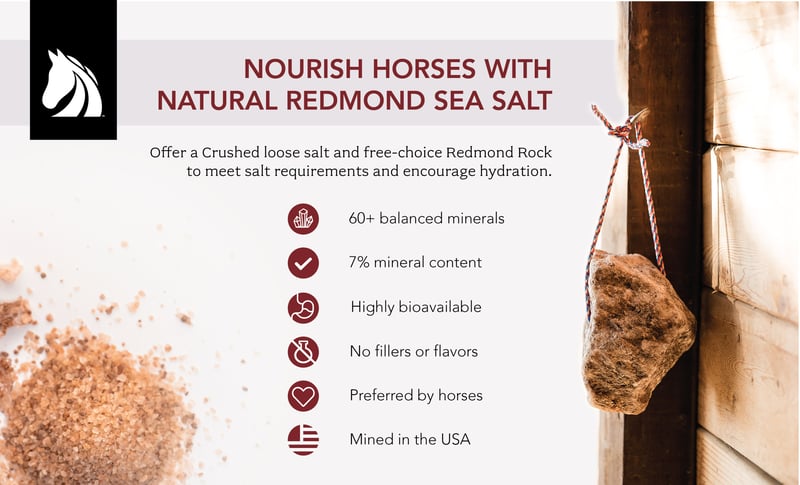How to Hydrate a Horse | Tips from Julie Goodnight
July 21, 2023
How to Hydrate a Horse | Tips from Julie Goodnight
In this article, award-winning educator Julie Goodnight talks horse hydration. Julie offers guidance to horse enthusiasts in articles and through clinics and appearances. She teaches horsemanship domestically and internationally, and was named Exceptional Equestrian Educator by Equine Affaire.
Getting a horse to drink enough water has been a challenge for a long time. So long, in fact, that “you can lead a horse to water but you can’t make him drink” is the oldest English-language proverb still in use, appearing for the first time before the year 1175. We’ve all heard it, and most of us have had first-hand experience trying to disprove it with horses of our own.
Too often I’ve seen horses that don’t drink enough water experience bouts of colic and mild digestive upset. Providing horses regular access to fresh clean water is important—especially for those that are finicky. No matter what you do with your horses, or where, water must be a top priority. Here are tips I use to help my horses stay hydrated at home and away.
Keeping Horses Hydrated Anywhere
- On the trail: When I led big pack trips through the Rocky Mountains, we made sure to take trails that bordered streams and that the horses were allowed to drink each time we crossed a stream. The experienced and wise trail horse drinks at every opportunity because he doesn’t know when the next opportunity will come.
- On the road: When we take our horses on the road, I make sure they have water breaks if they're in the trailer more than a few hours. We also carry water from home, just to make sure it is familiar and tempting.
- In the pasture: When horses are at home in the pasture, I make sure everyone knows what gates should stay open to allow horses access to water tanks. Horses need constant access to water.
Use Salt to Encourage Horse Hydration
Even if you offer water consistently, some horses will still refuse to drink enough. So, what can you do to ensure your horses keep drinking—especially when you have one that doesn’t want to?
Salt is a necessity in a horse’s diet. You know if you eat a bag of salty potato chips, you’ll crave a drink. I wouldn’t eat chips unless I had my water bottle in hand.
The same is true with horses. Salt encourages horses to drink more. It plays a vital role in hydration (water retention), muscle contraction, and contains nutrients and minerals vital to digestive health.
Drinking more water helps your kidneys keep the appropriate amount of electrolytes in the bloodstream. Proper hydration also positively impacts blood pressure. The same is true for horses.
Salt also plays a role in digestion by helping break down food and by increasing hydrochloric acid, which lines the stomach walls and aids in the digestion of food.
Choosing a Salt Supplement
Salt deposits are found in nature, and wild horses will find them in their foraging areas if left to roam. With domestication and confinement, it's up to horse owners to provide a quality salt source, since horses can't go looking for it on their own.
This is one of the biggest reasons you see salt blocks in every stable and pasture. When your horse licks salt, he begins to restore depleted sodium and chloride electrolytes. Perhaps more importantly, salt triggers his thirst instinct, and he begins to replace lost water.
But if you’ve seen a horse reject his salt lick, you already know the next problem: horses are notoriously picky eaters, and many horses dislike traditional salt and mineral blocks. If he doesn’t like the taste, he doesn’t lick the salt. If he doesn’t lick the salt, he doesn’t drink. And if he doesn’t drink, he doesn’t rehydrate.
Frustrated by horses rejecting processed salt and mineral blocks, many horse owners have rediscovered natural salt mineral licks. The major brands come from two sources: Himalayan brands, mined and shipped from Pakistan, and Redmond Rock, mined and shipped from central Utah.
Both sources provide natural rocks mined from ancient sea beds, which means your horse gets natural sea salt along with more than 60 trace minerals, in the same ratio as seawater, that become excellent building blocks in natural electrolyte replacement. More importantly, horses prefer the taste of natural salt mineral licks—they go back to the rocks again and again, triggering their natural thirst response, often putting an end to dehydration.
We may not be able to make a horse drink, but when we understand why, and provide natural mineral salt in a form they actually enjoy, we can work with nature and help our animals avoid dehydration and the serious health problems that come with it. Whatever salt you choose, make sure your horse has daily access to it and fresh, clean water.
Tips to Hydrate Any Horse
No two horses are alike—and neither is their water consumption. Here are four suggestions to ensure your horses keep licking salt and drinking water no matter where you are or what kind of horse you have.
For the Traveling Horse
Before we leave on a trip with our horses, we package their daily grain ration and supplements in a baggie—one for each day (or two baggies if they get grain twice a day). I always add a little loose mineral salt (Daily Red Crushed) to each baggie to ensure each horse is drinking well and we don’t have to carry around a salt lick.
For the High-Maintenance Horse
I know some horses that just won’t lick a rock. Of course, these seem to be the same horses that don’t drink enough. For these horses, I like to top-dress their feed with Daily Red Crushed loose mineral salt every day.
Since horses are generally very good about monitoring their own salt intake, I don’t want to force too much salt on them. Start with about a half an ounce and monitor horses' water intake and urine output (how much shavings are you going through?). If horses still need to drink more, add a little more salt to their ration.
For the Type-A Horse
Some horses feel stress more than others and lead a very physically and mentally stressful life. Research has shown that many of these horses are prone to ulcers, which may manifest as poor appetites, decreased energy, lackluster attitude and colic-like symptoms.
Horses prone to ulcers may be reluctant to consume salt, but still need some in their diet. My number one horse, Dually, falls into this category. For him, I feed Redmond Daily Gold, a clay-based mineral supplement that helps neutralize stomach acid buildup and improves appetite and digestion.
For the Finicky Horse
Some horses won’t lick a salt rock on the ground, but if you hang it up on a fence, they'll enjoy it more. Hanging a salt rock (put it near the horse's water bucket to encourage drinking), makes it an enticing toy and keeps it clean. Some picky horses won’t lick a rock on the ground if it's dirty.
Remember, to keep horses hydrated, give them daily access to fresh, clean water and provide a quality salt source.
Enjoy the ride!
—Julie Goodnight
Redmond offers quality mineral salt supplements for horses mined from one protected source in Utah, USA. Every product contains 60+ nature-made, bioavailable minerals that nourish and support. Click below to shop our full line of Redmond Rocks and easy-to-feed loose mineral salts. Purchase with confidence with our love or return it guarantee!
Learn More
- Is your horse drinking enough? Learn how to check for dehydration in horses.
- Learn the truth and debunk common myths about salt licks for horses.
© Redmond Equine 2023. All rights reserved.
Related posts

Redmond Daily Red: Crushed vs Fortified Loose Horse Minerals
Daily Red Crushed and Fortified loose mineral salt supplements help hydrate, balance, and nourish horses. Learn which option is best for your equine.
December 18, 2024

Redmond Daily Duo: Foundational Horse Mineral Supplements
Choosing the right minerals for your horse is vital. Redmond keeps it simple with two core mineral supplements that support horse gut health and...




